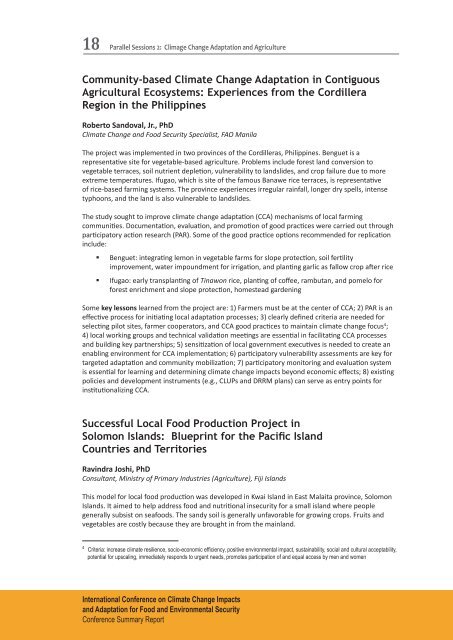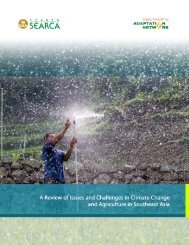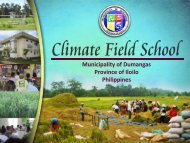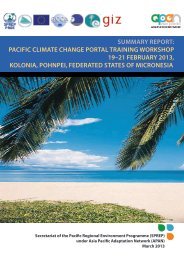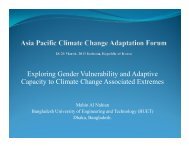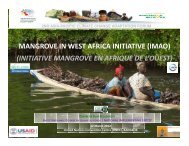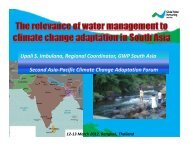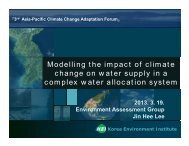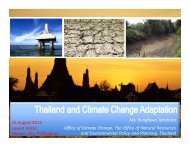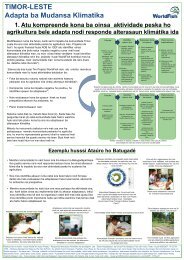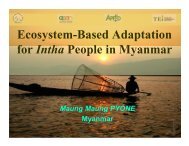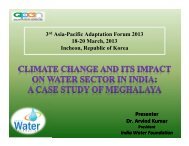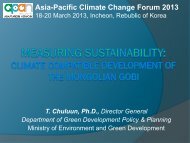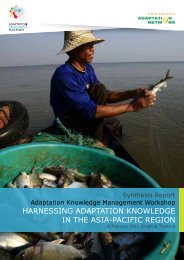PDF file (2.44 MB) - Asia Pacific Adaptation Network
PDF file (2.44 MB) - Asia Pacific Adaptation Network
PDF file (2.44 MB) - Asia Pacific Adaptation Network
You also want an ePaper? Increase the reach of your titles
YUMPU automatically turns print PDFs into web optimized ePapers that Google loves.
18Parallel Sessions 2: Climage Change <strong>Adaptation</strong> and AgricultureCommunity-based Climate Change <strong>Adaptation</strong> in ContiguousAgricultural Ecosystems: Experiences from the CordilleraRegion in the PhilippinesRoberto Sandoval, Jr., PhDClimate Change and Food Security Specialist, FAO ManilaThe project was implemented in two provinces of the Cordilleras, Philippines. Benguet is arepresentative site for vegetable-based agriculture. Problems include forest land conversion tovegetable terraces, soil nutrient depletion, vulnerability to landslides, and crop failure due to moreextreme temperatures. Ifugao, which is site of the famous Banawe rice terraces, is representativeof rice-based farming systems. The province experiences irregular rainfall, longer dry spells, intensetyphoons, and the land is also vulnerable to landslides.The study sought to improve climate change adaptation (CCA) mechanisms of local farmingcommunities. Documentation, evaluation, and promotion of good practices were carried out throughparticipatory action research (PAR). Some of the good practice options recommended for replicationinclude:• Benguet: integrating lemon in vegetable farms for slope protection, soil fertilityimprovement, water impoundment for irrigation, and planting garlic as fallow crop after rice• Ifugao: early transplanting of Tinawon rice, planting of coffee, rambutan, and pomelo forforest enrichment and slope protection, homestead gardeningSome key lessons learned from the project are: 1) Farmers must be at the center of CCA; 2) PAR is aneffective process for initiating local adaptation processes; 3) clearly defined criteria are needed forselecting pilot sites, farmer cooperators, and CCA good practices to maintain climate change focus 4 ;4) local working groups and technical validation meetings are essential in facilitating CCA processesand building key partnerships; 5) sensitization of local government executives is needed to create anenabling environment for CCA implementation; 6) participatory vulnerability assessments are key fortargeted adaptation and community mobilization; 7) participatory monitoring and evaluation systemis essential for learning and determining climate change impacts beyond economic effects; 8) existingpolicies and development instruments (e.g., CLUPs and DRRM plans) can serve as entry points forinstitutionalizing CCA.Successful Local Food Production Project inSolomon Islands: Blueprint for the <strong>Pacific</strong> IslandCountries and TerritoriesRavindra Joshi, PhDConsultant, Ministry of Primary Industries (Agriculture), Fiji IslandsThis model for local food production was developed in Kwai Island in East Malaita province, SolomonIslands. It aimed to help address food and nutritional insecurity for a small island where peoplegenerally subsist on seafoods. The sandy soil is generally unfavorable for growing crops. Fruits andvegetables are costly because they are brought in from the mainland.4Criteria: increase climate resilience, socio-economic efficiency, positive environmental impact, sustainability, social and cultural acceptability,potential for upscaling, immediately responds to urgent needs, promotes participation of and equal access by men and womenInternational Conference on Climate Change Impactsand <strong>Adaptation</strong> for Food and Environmental SecurityConference Summary Report


